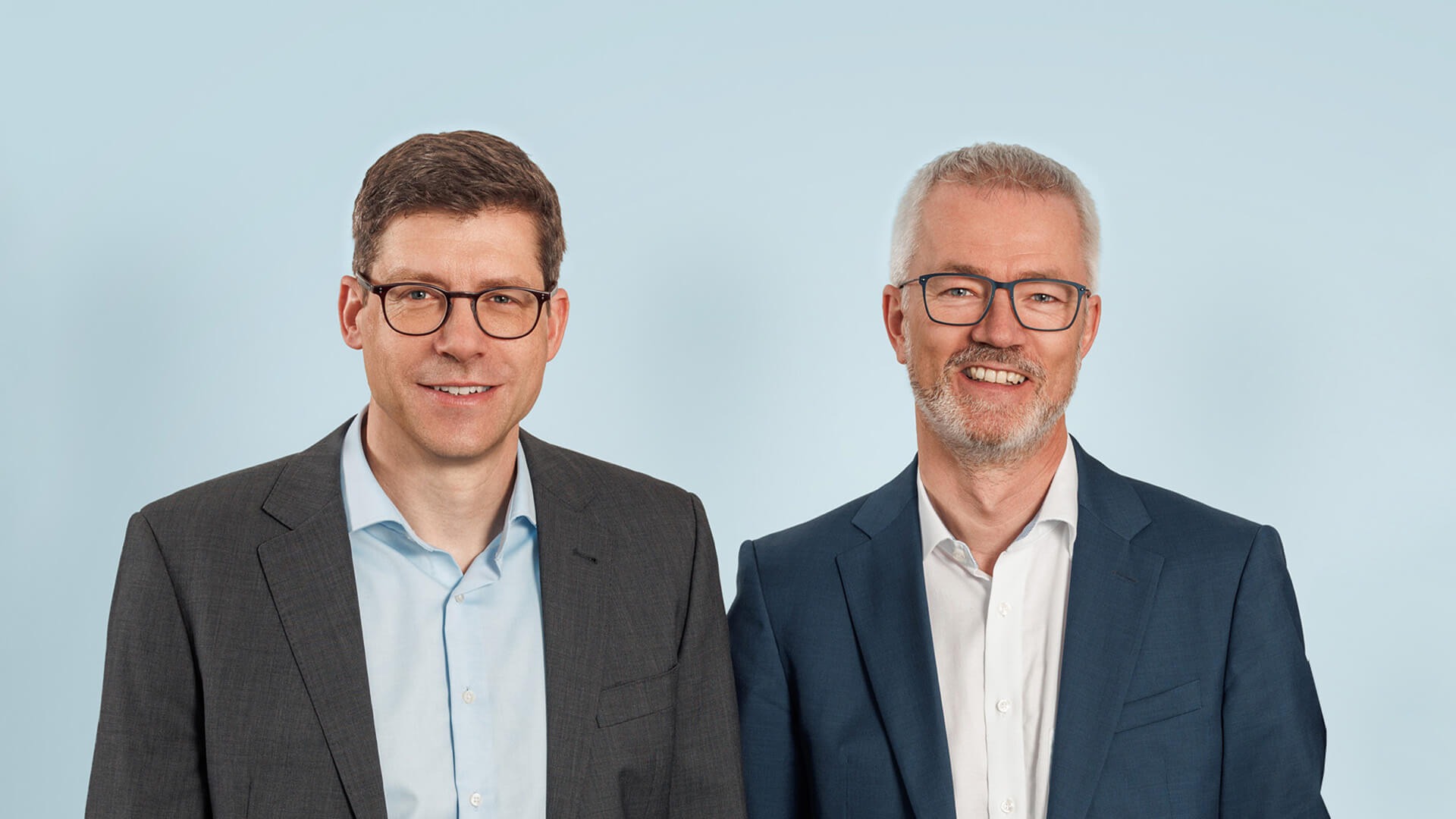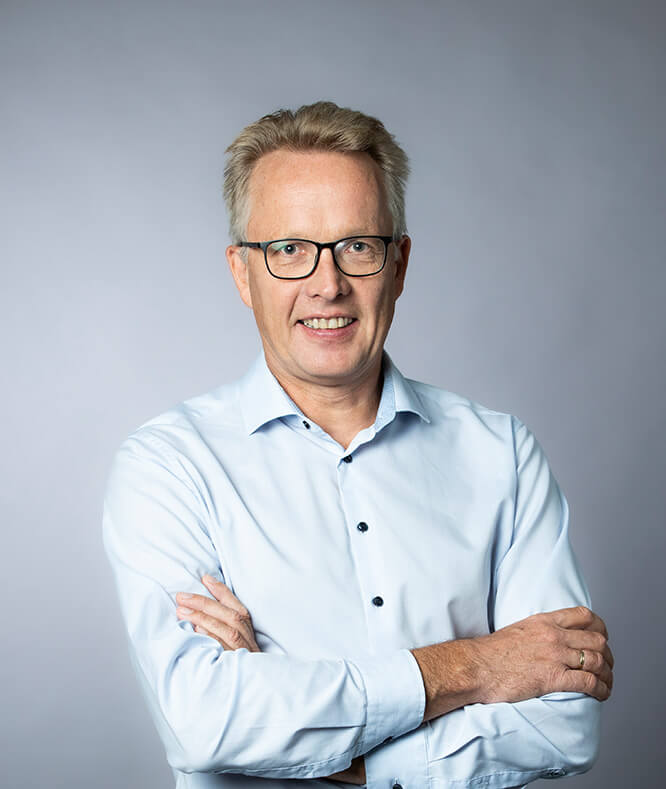Against the tide – HTGF portfolio SciRhom company rewarded for courage with EUR 63 million Series A financing
In July, HTGF portfolio company SciRhom announced one of the largest financing rounds in German biotechnology this year and will soon begin clinical trials of its first drug. The company’s unique therapeutic approach targets a central node of the immune system. In this interview, company co-founder and current SciRhom Managing Director and COO Jens Ruhe, his Co-Managing Director and CEO Jan Poth and Frank Hensel, Principal at HTGF, provide insights into the collaboration that has been in place since 2016 and the next milestones for the company.

SciRhom began with a scientific speculation that was not without controversy. What exactly was it about?
Jens Ruhe: Contrary to the prevailing opinion at the time the company was founded, SciRhom decided to pursue a novel approach against autoimmune diseases with a therapeutic antibody directed against iRhom2. Antibodies react with structures on the surface of cells. However, the conventional wisdom was that the processes we are targeting take place entirely inside the cells and are therefore beyond the reach of an antibody. We, and above all our scientific co-founder Carl Blobel, who established the foundations of SciRhom’s approach at a renowned US research institute, were of a different opinion. In this respect, SciRhom was indeed swimming against the tide in the founding phase.
Jan Poth: I was impressed by the courage of the founding team when I joined SciRhom from Boehringer Ingelheim in 2022 – and I still am. This early positioning allowed us, among other things, to establish broad patent protection for the therapeutic strategy developed by SciRhom. This is a potential competitive advantage for a fully developed drug. In addition, years of very meticulous scientific work have gone into identifying and characterising this antibody and underpinning it with positive test results.
How did HTGF get involved and what convinced the team to take this risk?
Frank Hensel: In the healthcare sector and in biotechnology in particular, we as HTGF want to convert ideas into start-ups that are based on bold decisions and can deliver therapeutic solutions that are clearly better than current standard therapies.
I believe that in the case of SciRhom, two factors were decisive for the investment. Firstly, one of the strengths of HTGF came into play: Our team of around 20 people in Life Sciences & Chemistry combines diverse academic and entrepreneurial experience in order to be able to immerse ourselves deeply in science. For example, I had gained experience in the field of therapeutic antibodies and knew how potent such an approach can be if the active ingredient is developed carefully and smartly. It’s not for nothing that antibody therapies are currently the most successful class of drugs.

The other important deciding factor was clearly the quality and experience of the SciRhom team. Jens and his co-founder Matthias Schneider had already gone through the entire value chain as part of a previous start-up – U3 Pharma AG. U3 Pharma emerged from the laboratory of Professor Axel Ullrich at the Max Planck Institute of Biochemistry. Here, too, the team developed therapeutic antibodies through clinical trials. And in 2008, U3 was acquired by the pharmaceutical company Daiichi Sankyo for around 150 million euros. So we knew that the SciRhom team had what it takes to master this challenge a second time. And such serial founders are very important for the sustainable growth of the German biotechnology sector.
Jens Ruhe: Interestingly, our team’s background also had a disadvantage. As SciRhom was not a classic university spin-off and our team already had many years of development experience, some of the usual funding pots for start-up teams were not accessible to us. This made the question of whether HTGF would get involved as an early-stage investor even more decisive. A “yes” from HTGF acted as an important nucleus for approaching and attracting the interest of other early investors. I therefore still remember our first visit to Bonn very clearly – and how impressed we were as founders that there were knowledgeable experts on the investor’s side who were able to evaluate our idea in a well-founded manner.
If SciRhom is successful with its approach, what could this mean for patients with autoimmune diseases?
Jan Poth: In autoimmune diseases, put simply, the immune system mistakenly attacks the body’s own tissue. Over the last two decades, several new drugs have been launched on the market for these diseases. As a rule, these drugs target precisely one area to alleviate disease symptoms or slow down the progression of the disease. However, daily practice shows that a kind of glass ceiling has been reached regarding their effectiveness. The therapeutic benefit for the patient can no longer be increased with this paradigm, so a new one is needed.
With iRhom2, SciRhom’s approach targets a molecule that is located at the interface or, in a certain sense, at the origin of several disease-promoting processes, and thus promises significant advantages. However, if you want to address such a junction, you have to proceed very specifically and very carefully so that only the processes you intend to influence are affected and side effects are minimised or excluded.
In June 2024, SciRhom closed a new financing round with €63 million. HTGF participated again, as did six national and international venture capital funds. What will the fresh capital enable the company to do?
Jens Ruhe: We can continue and intensify our research and development activities. In principle, we had everything in place for the start of the first of three clinical phases. The regulatory authorities have given their approval for the clinical trial plan, a renowned clinical centre in Austria is acting as a partner and an established molecular biomarker is helping to prove the basic mechanism of action of our antibody in humans. When the first phase is expected to begin in the coming weeks, SciRhom will have reached a historic milestone. With the new funding, we now want to carry out this study, further substantiate the safety of the active substance and then provide clinical proof of efficacy in two patient populations in further studies. Achieving this will naturally increase the value of the development candidate and thus the value of the company many times over.
How would the HTGF categorise SciRhom funding in a national and international context?
Frank Hensel: The financing is one of the biggest rounds on the European stage this year and in several recent years, actually. The consortium is broadly based and highly qualified with the new investors Andera Partners, Wellington Partners, Hadean Ventures, MIG Capital, Kurma Partners and Bayern Kapital. The fact that SciRhom was sufficiently financed to bring its active ingredient to clinical maturity was certainly a clear advantage.
After last year’s somewhat difficult financing situation for the German biotech sector, things are looking more positive again this year. In addition to SciRhom, companies such as our portfolio company Tubulis and the cancer specialists CatalYm and ITM have each raised three-digit million euro sums from venture capital funds. On the exit side, 2024 is also already a good year, as we can see from the acquisition of the HTGF portfolio company Cardior Pharmaceuticals by the Danish pharmaceutical group Novo Nordisk, for example. Novo is acquiring Cardior for an amount of up to €1.025 billion if certain development and commercial milestones are reached.
Overall, the SciRhom funding fits in well with the current upward trend and increasing maturity of the sector. And SciRhom shows once again that there is excellent science in Germany and that such innovations can also attract investors.
SciRhom is opening a new chapter with the Series A financing. What would an interim conclusion look like?
Jan Poth: For me, this story is a prime example of how biotech start-ups work best. A founding team that is absolutely convinced of the science meets an investor who can assess the risk but is not afraid of it. Motivated by the HTGF seal of approval, private investors participate in the start-up and in subsequent rounds. HTGF thus acts a bit like a talent factory in sport – with the right nose to recognise the complete player of tomorrow in a young talent.
Jens Ruhe: In recent years, we have optimised and characterised our therapeutic agent, found cooperation partners to produce it in larger quantities, built up strong patent protection and much more. Now it’s time to take the next important steps and bring our approach into clinical trials, and thus closer to patients who need better treatment options. Without HTGF, this first phase of the company’s history would certainly have been more arduous and may not have progressed as far.
And for the HTGF? Has the project thus reached a “happy end?”
Frank Hensel: “Happy” yes, but we’re certainly not at the end yet. The role of HTGF naturally changes after such a financing round, but we continue to support SciRhom. Such successes enable us to initiate new activities and certainly give us a little personal “push.”
To summarise, I would say that we have once again succeeded in supporting a biopharmaceutical start-up from the concept phase through to clinical trials of the first active ingredient – now one of almost 20 cases in our portfolio. And with a cumulative investment sum that is comparable to the research expenditure that pharmaceutical companies also have to spend on such a balance sheet. Such cases are therefore further confirmation that HTGF can also be a driver of medical progress.
Thank you very much for these exciting and valuable insights!

